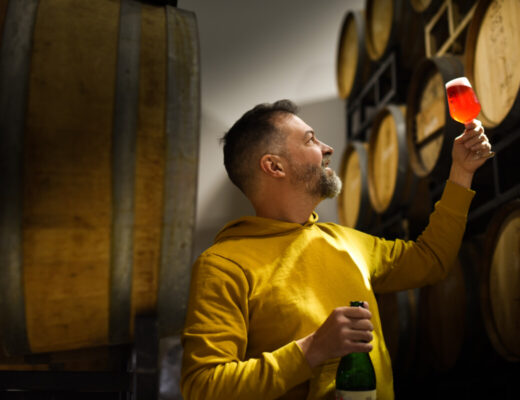A presentation and panel discussion titled India: The Next Big Thing? took place during the Women in Wine Expo held in London, England earlier this year. Moderated by wine journalist Ruma Singh, DipWSET, the panel consisted of powerhouse women in wine: publisher Ritu Singhal, wine expert Sumita Sarma ACA, DipWSET, and wine consultant Vidya Narasimhan.
These three women discussed the uprise of the wine market in India, but also the suppression faced by women in the industry and what needs to happen to overcome these obstacles.
Read Also: Laura Catena: The modern matriarch of Argentine wine
Thankfully, a new regime is embracing free trade and tariff reduction which will be sure to help push India’s wine economics to new heights. The wine world certainly has an eye on India concerning imports and exports of its wine.
Sumita Sarma proudly speaks on India’s wine becoming the next the big thing: “…the premium wines are as good if not better than some of the French and American wines. They carry excellent expression of both the new world and the restraint of the old world, a beauty in which I am completely shocked, and pleasantly surprised.”
Speaking on education costs and inclusiveness for women in wine, Vidya Narasimhan says “wine education, if it improves in India to become more informal and relaxed – and a safe space for women – can definitely be the next big thing.”

Ritu Singhal
A Q&A with Ritu Singhal
Panelist Ritu Singhal delivered a presentation prior to the panel discussion at the Women in Wine Expo on wine in India. Her humbleness within her success was quite admirable, as she hadn’t even mentioned her many achievements and titles until the WIWE founder Senay Ozdemir graciously announced her work history to the attendees. A deeper look proved that Ritu has almost single handedly brought fine wine to the Indian wine market.
Ritu manages beverage magazines – ‘FINE Wine & Champagne India’ and ‘Liquid’ – the only wine and spirits magazines to be officially recognized in India. To quote Radhika Tandon’s article in Liquid, titled Women and Alcohol in India: There’s a clear gap between reported numbers, and the industry trends that are being seen… but old stereotypes around what women drink no longer apply.
While some statistics on Indian wine can be misleading, as there are still some social taboos when it comes to alcohol within the country, other research shows a clear uprise, and Group Ritu has their finger on the pulse of this industry, or rather, is the pulse itself. Ritu, who is the co-founder of Group Ritu, runs a company that introduced formal wine education in India, promotes Indian wine in foreign countries, and even created the brand Wines of India in 2010, and the list goes on!
Facing an almost impossible market structure, tight-fisted and costly retail regulations, including prohibited alcohol advertising within India, Group Ritu has diligently navigated the business by creating a completely new distribution channel across India.
Curious to dig deeper, I jumped at the chance to speak with Ritu Singhal about her achievements and asked for her thoughts on the rise of India, and it being the next big thing in wine:
Leah Spooner: What are some of the primary differences between being an Indian woman in the wine world when you first started compared to today?
Ritu Singhal: In 1993, my husband Rajiv and I were young and ambitious entrepreneurs. As part of our pioneered actions in the luxury space, we laid the foundations for the wine culture. There were not many women in wine, maybe some in communication roles. The role of women around alcohol was somewhat blurred by the law. We encouraged more people to join the wine space and I allayed fears to help women to take on roles that they had not approached before – sommeliers, educators, wine makers, importers, etc. With these trailblazers, we have created a space which has a permanent role for women.
Leah Spooner: You have put forth an incredible amount of time and energy into having your company, Group Ritu, government approved. Why was this so important?
Ritu Singhal: At Group Ritu, (interests in trading, consulting, publishing, representation, e-learning, private equity) we strongly believe that ethical business practices are very rewarding. We chose to work the fabled Indian bureaucracy to convert opportunities through legal channels that were hitherto unknown to India and pave the way for others. Our attention to compliance allows us to concentrate on strategic operations and growth and not have the Damocles sword hang over our heads. For us, not following the law is not an option.
When we imported the first official consignment of Churchill China from Stoke-on-Trent, HM The Queen graced our launch in 1997. We created opportunities for sampling alcohol in trade shows by setting up tasting booths within the framework of local laws. And we forego high revenues as our wine magazines are the only ones in their space that don’t advertise alcohol in line with the law of the land. Others blatantly violate this.

Champagne has contributed to the growth of India’s wine market.
Leah Spooner: How has the luxury market, specifically Champagne, contributed to your personal success and that of Group Ritu? And how does it impact and contribute to the uprise of India’s wine market?
Ritu Singhal: We were early movers in the luxury sector in India. Having succeeded in building the wine market, our progression to Champagne since 2005 allowed us to pitch the luxury element. Rajiv as Ambassador of Champagne to India and Group Ritu created the market for Champagne in India and worked on communicating its image to potential consumers through education, promotion and protection. The king of wines, Champagne, has seen multi-fold growth in the last 15 years. Champagne was the first international Geographical Indication registered in India and has set the tone for the protection of the appellation. Champagne has contributed to, and benefitted from, the growth of the wine market. The Singhal family deepened its links with the region by acquiring vineyards in the Marne, registering as the first vignerons from India and releasing our own Champagne Challiol & Charmetant in London.
LS: As it sits now, wine consumption in India accounts for 0.4% of the country’s alcohol consumption. What wine trends do you forecast for consumers?
RS: Indians drink and drink a lot. India records the largest consumption of alcohol in the world, even if the statistics are somewhat unreliable. Wine has not been a part of the culture, and other alcoholic beverages – whisky, rum, beer – have captured the Indian consumers’ share of throat. In the last 25 years, with the strategic interventions and activities of Group Ritu, the wine market in India is growing steadily despite the exorbitant taxes and tariffs that the industry is tortured by.
The typical characteristics of low alcohol, healthy, wider range to choose from, are making wine a preferred choice for the more informed and travelled consumer. The Indian wine industry is growing rapidly, and this is making wine more affordable and accessible. Wine might be waiting for that defining eureka moment to stamp its authority on the alcohol market, but as trends and preferences change, wine is here to stay.
LS: Can you describe the importing/exporting challenges India faces within the global market and how you are facing them?
RS: India is a net importer of wine. And it is said that the wine import business is one of the toughest businesses to be involved in.
The constitution of India discourages alcoholic beverages for consumption OR directs the state not to embrace the consumption of alcoholic beverages. The duties and taxes are imposed at the country level and compounded with state level levies. The net result is almost 300-400% cumulative taxes in some states. A few states in India impose complete prohibition.
Complex regulatory framework in which compliance is costly. A federal system is in place, and alcohol is a state subject, so the importers and distributors need to deal with 36 territories – each with its own leanings on policy for alcohol. The multiplicity of laws that apply to this trade make the paperwork extremely complicated and very challenging to fulfill. For example, multiple point to point time bound transport permits needs to be issued for the wine to be transported from port to the point of sale.
Alcohol retail is also strongly regulated – the shops are mostly state owned and most don’t offer the best experience. The scenario is changing with the arrival of some posh retail outlets in cities and airports. Online was forbidden – trials during the pandemic have had mixed impact on acceptance as new policy Alcohol advertising is prohibited and surrogate advertising is discouraged. But the enforcement is very poor, and FINE Publishing India is the only publishing house to follow the law in letter and spirit in its magazines “FINE Wine & Champagne India” and “Liquid”.
LS: What does the new regime in terms of free trade and tariff reduction personally mean for you and your business, and how do you think it affects wines of India as a whole?
RS: For the first time in the history of independent India, the government has accepted to reduce the tariffs on alcohol in the agreement with Australia that came into force at the end of 2022. Opening up accessibility of the Indian market bodes well for the industry. Better quality wines from around the world should be available to Indian consumers at competitive prices. This opening up will be perceived as a very important concession and will encourage more international companies to look at the Indian market seriously and share their best practices with local companies.
LS: What makes the wines of India unique in your eyes?
RS: “Wines of India” was a brand that was created by Group Ritu in 2010 with a mandate from the Indian Grape Processing Board. This platform was supported by the Ministry of Food Processing which led the first ever official group of Indian wineries to gain visibility overseas at the London Wine Fair. Indian wines have gone a long way and improved substantially in the past decade. Several have managed to gain recognition internationally while many have a lot to do to reach international standards.
– Leah Spooner is a contributing editor with VineRoutes
![]()













